Can you remember the last time your parents scolded you for swearing?
Throughout childhood, we’re conditioned to believe that swearing is inappropriate and crass. You could offend someone, it makes you seem uneducated, it’s unprofessional in the workplace… the list of reasons we’ve been told not to swear goes on and on.
But how bad is swearing, really? Is there a chance that it could be beneficial in business and optimization? As with most things people have told you that you absolutely should not do, there’s a chance you should be testing it.
Table of contents
What Do Psychologists Say About Swearing?
There are a lot of different categories for swear words, or taboo words as they’re often referred to in the academic world, to fall under. Here are a few according to Dr. Timothy Jay, who has done quite a bit of research on the psychology of swearing…
- Sexual.
- Blasphemous.
- Scatological.
- Animal-related.
- Ethnic, racial, gender or sexual orientation slurs.
- Ancestral allusions.
For the most part, you’ll find yourself swearing more often in one of two scenarios…
- Social swearing. You’re hanging out with a group of close friends or at the bar after work with colleagues.
- Negative swearing. This doesn’t require an audience; I know you’ve dropped a “fuck” when you’ve stubbed your toe or burned dinner.
While swearing generally gets a bad reputation, research suggests that the human tendency to swear actually isn’t as problematic as we assume…
Swearing can occur with any emotion and yield positive or negative outcomes. Our work so far suggests that most uses of swear words are not problematic. We know this because we have recorded over 10,000 episodes of public swearing by children and adults, and rarely have we witnessed negative consequences.
Once you’re old enough that your parents won’t get you in trouble for swearing, it’s unlikely you will experience negative social or physical consequences.
Also, it’s not only frat boys swearing outside of a pub at 2:30 a.m. It’s Bryony Shaw, Olympic windsurfer, proclaiming that she’s “so fucking happy” after winning a medal. (Yes, BBC apologized for the slip, but it was undoubtedly a positive turning point for Bryony.)
Why? Because we actually swear to convey a wide range of emotions, not just negative ones…
Swear words can achieve a number of outcomes, as when used positively for joking or storytelling, stress management, fitting in with the crowd, or as a substitute for physical aggression.
In fact, there are quite a few reasons you might swear (whether it’s a conscious decision or an automated response)…
- You’re experiencing pain.
- In one study, undergrads asked to repeat a strong swear word were able to keep their hand in icy water for 40 seconds longer, on average, than when they repeated a neutral word. Afterwards, they also rated their pain as less intense if they repeated a strong swear word.
- You’re trying to build social bonds.
- Swearing can show you feel comfortable, that you’re being completely honest. If others are swearing, it can show you belong – maybe even build a bond or liking. Cialdini’s persuasion principle, “Liking,” says the more you like someone, the more you’ll be persuaded by them.
- You’re trying to be funny.
- A well-timed or unexpected swear word can be very funny.
- You’re angry and frustrated, but trying to avoid violence.
- It’s a form of release.
- You’re trying to add emphasis to what you’re saying.
- It adds emotion, urges people to pay attention.
- You’re fired up.
- In one study, after playing a violent video game for just 10 minutes, participants were able to write down significantly more swear words than those who had played a golf video game (much more relaxed).
You might be sitting there thinking, “Yeah, but I hardly ever swear. That’s for less intelligent people.” Actually, a study found that people who know a lot of swear words are more likely to have a big vocabulary.
In the words of Stephen Fry, “The sort of twee person who thinks swearing is in any way a sign of a lack of education or a lackof verbal interest is just a fucking lunatic.”
The reality, according to Dr. Timothy Jay, is that everyone swears on the regular, even you…
Swearing generally draws from a pool of 10 expressions and occurs at a rate of about 0.5 percent of one’s daily word output. However, it is not informative to think of how an average person swears: Contextual, personality, and even physiological variables are critical for predicting how swearing will occur. While swearing crosses socioeconomic statuses and age ranges and persists across the lifespan, it is more common among adolescents and more frequent among men.
Swearing an average of 0.3% to 0.7% of the time is a small, but significant percentage of overall speech. Frequently-used personal pronouns (I, you, he, she, it, we, they, me, him, her, us, and them) are only used at approximately 1.0% rate in speech.
So, Does Swearing Make You More Persuasive?
In one study, testimonies with profanity were considered more believable than those without.
Another study found that political speeches that include a mild swear word, like “damn” or “shit”, swayed sympathetic listeners more than speeches without a mild swear word. Likely because of the hint of passion. Listeners who were not sympathetic found it off-putting, making them even more skeptical.
Psychologists from Northern Illinois University found that using swear words to emphasize a point can improve the persuasiveness of your argument by increasing the perceived intensity without hurting credibility.
In a similar experiment, the use of swear words in a word-location task increased participants’ ability to recall the location of the word. Why? The amygdala lights up when a swear word is heard or read. It’s closely connected to memory and association centers in the brain.
Though, it’s important to note that people who swear habitually are noticeably less influenced by the use of swear words.
Obviously, It’s Risky to Swear in Copy
So, we all swear (quite frequently) and that can make us more persuasive. Why don’t we swear in every bit of copy that we write, then?
Because, of course, swearing comes with a degree of risk. Like most things, it can backfire.
In one study, participants said they would perceive a co-worker who swore in a formal meeting to be incompetent. From persuasive to incompetent… that’s quite a jump.
James Turner, a conversion copywriter and CRO consultant, explains why he is skeptical of swearing in copy…

James Turner, Turner Creative:
“I have never used swearing in my copy.
To be honest, I just can’t do it…nor make a case for it.
I’ve always respected Seinfeld for his ability to be completely hilarious and not swear (unlike so, so many stand-up comedians), and I guess that’s ported over into my writing life.
That having been said, I’ve also never worked on a project where I thought that swearing would even come close to being useful.
I can concede that, in some cases (and you’d have to show me a lot of Voice of Customer data to convince me) it MAY be helpful. And, of course, some brands might need you to swear in order to stay on brand; that might be their thing, and not doing it might alienate existing customers/readers.”
But… Context and Relevancy Go a Long Way
As James points out, swearing can be appropriate in cases where context and relevancy make it so.
Jen Havice of Make Mention Media, for example, has had success with swearing in her copy thanks to context and relevancy…

Jen Havice, Make Mention Media:
“I have used swearing in my copy. In fact, I entitled my talk for this year’s CXL conference – From WTF to Hell Yes: Improve conversions with undeniable value… from sex to chocolate, Oprah to T&A. And in this instance it did work.
The response from the audience was more than a little positive.
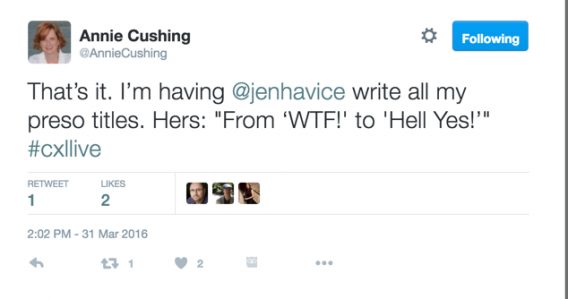
But using expletives (even in acronym form), isn’t something I normally do in my copy. Why this time? Because it made sense within the context of what I was saying and the group I was saying it to.
Context and relevance are critical – no matter what words you’re using. Which means you need to know what’s appropriate for your audience and the messages that will stick. Otherwise, you may turn them off before you even get a chance to turn them onto what you’re saying.”
Among optimizers who follow Peep and the CXL brand…
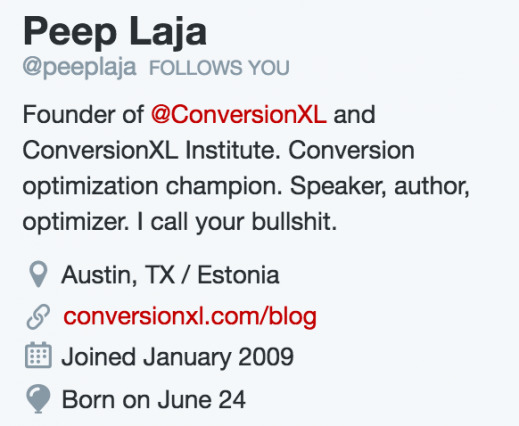
…a little bit of swearing made sense and went over well. If she had been presenting to a different audience, her presentation might have fallen flat.
Studying your audience’s language can go a long way in deciding whether or not swearing in your copy is appropriate. People are more or less likely to swear based on many different factors, including their personality. For example, personality research suggests that people who swear often score higher for traits like extraversion.
Lianna Patch of Punchline Conversion Copywriting explains…

Lianna Patch, Punchline Conversion Copywriting:
“Swearing in copy is a lot like humor in copy–it’s appropriate for some markets, but not for others. I like to give the example of a comedy conservatory with funny copy vs. a funeral home with funny copy, which, yeah, is maybe not such a great idea.
The bottom line is just to be who you are. If that includes swearing, go for it! The worst that can happen is you’ll turn off potential clients who probably wouldn’t have been a great fit anyway.”
Note that your audience’s language can change as your relationship with them progresses. Actually, as Joel Klettke of Business Casual Copywriting and Case Study Buddy explains, swearing can say a lot about the stage of the relationship, about the bond shared…

Joel Klettke, Business Casual Copywriting & Case Study Buddy:
“I’ve used it, but mostly in milder ways.
I did a small run of Business Casual promotions where I called myself a “kick-ass conversion copywriter”, and also handed out notepads with the same messaging. The feedback on those was nothing but positive, though I suspect those who didn’t enjoy it would have stayed pretty silent.
In client work, we’ve used swearing in email series in more overt and flagrant ways.
In these cases, though, we were speaking to an audience who followed along with the brand/person largely because of their no-punches-pulled personality; at the stage we started deploying f-bombs, they were more like guests in a living room than clients on the other side of the register.
Even so, we did it sparingly – to make a point or to shock the reader into continuing on. Swear too often, and the gimmick is overplayed.
We never tested swearing vs. not swearing, but again, it ‘worked’ in that those who opposed it quickly removed themselves from the email list, and those who didn’t mind (our real audience) stuck around.”
Swearing can even help take new relationships to a deeper level, creating an entirely new context.
A study found that the use of swear words allowed factory workers to bond over and build solidarity based on shared frustrations. Likewise, researchers found that in an office setting, clever uses of casual swear words boosted morale and lowered stress.
As Lianna alluded to above, writing copy that reflects your in-real-life tendencies and showcases your personality can be an excellent way to filter out low quality leads and customers…

Lianna Patch, Punchline Conversion Copywriting:
“Fuck yes. My own website copy contains swear words. And yeah, I think it ‘works,’ in that my swearing (and the general tone of the site copy) helps clients self-select whether or not they want to work with me.
I don’t go around dropping F-bombs on discovery calls just for the hell of it, but similar communication styles absolutely yield better working relationships. My goal is to work with clients who not only trust me with their marketing, but who feel comfortable enough to swear when they feel like it (hopefully not at me, though).”
In case you didn’t have time to click through, here’s a screenshot of Lianna’s homepage…
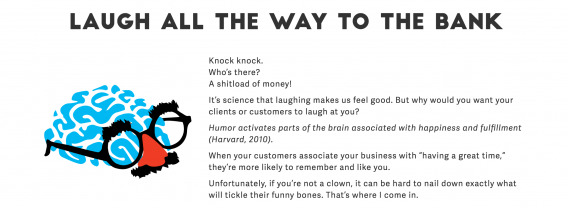
My favorite example of using swear words to show personality in copy is Be an Unfucker, a site dedicated to fighting “eco apathy”…

Ok, but WTF about euphemisms, acronyms and the types of words you find on Urban Dictionary? Joanna Wiebe of Copy Hackers and Airstory makes the case for using them instead…

Joanna Wiebe, Copy Hackers & Airstory:
“I rarely swear when writing copy, although I do use euphemisms and casual lingo. But in my emails, I freely use words like ‘shite’ and ‘Helsinki’ (instead of ‘hell’) because that’s how I talk. I’ll write a$$ instead of ass. That kinda stuff. I shy away from the F word, though, cos it can come across as realllllly harsh in print.
Bob Bly scolded me for using the word “mofo” at the end of a guest post on Copyblogger a few years back. That was a career highlight.”
Joanna also uses the word “mofo” in our Beginner’s Guide to Conversion Rate Optimization…

She might be on to something. Research has found that they are less likely to trigger strong emotional responses…
Euphemisms (such as ‘the F-word’), clever acronyms whose meanings are clear (for example, ‘FCUK’), and taboo words learned later in life (when learning a second language) have not been associated with emotions through conditioning to the same extent, and as a result, do not trigger strong emotional responses.
In the study, volunteers who read the actual swear words aloud showed increased sweating compared to those who read the politer, censored expressions (e.g. “f-word”).
Of course, this lack of a strong emotional response to euphemisms can also be a bad thing. No risk of a strong negative emotion, no chance of a strong positive emotion.
So, When (If Ever) Should You Swear?
It’s risky to swear in your copy and it’s risky not to swear. What’s the right thing to do, then?
First, be aware of and assess your personal risk level. Take the time to conduct the qualitative research. Who is your audience? What are they like? What words do they use? What words do they expect you to use based on your existing brand?
Without testing, you simply can’t know for sure whether swearing makes sense, but you can make an educated guess about whether it’s even worth the risk.
James cautions that the risk that comes along with swearing in copy is big, meaning you should be very confident in your qualitative data…

James Turner, Turner Creative:
“Only under extreme caution would I recommend others use swearing in their copy. Only when you are certain that you must or should (or can).
My thinking is that it’s much more likely that you’ll offend someone by swearing, than you will put someone off by not swearing.
My last thought on the matter is that swearing might work and be a cheeky “did she/he just say that?!” type of moment in a video, but having a swear word just sitting there, obnoxiously monopolizing the page (and I submit that it would do just that), there for all to see, is likely to be more of a distraction than anything else. And would, in my opinion, lower the tone of most brands’ copy.”
He has a point. You won’t offend someone by not swearing in your copy, but you might offend someone if you do. By simply not swearing, you avoid the risk of offending someone altogether. But, at the same time, you risk losing an opportunity to trigger a strong emotional response.
I’m not sure the risk of offending someone is reason enough to avoid swearing altogether. Perhaps the real trick is finding the perfect swear words to use. How can you use swear words that are “impactful” without verging on “offensive”? I’d wager that answer is different for every audience.
Joel seconds the notion that you can always get along without swearing, adding that it can even become a crutch…

Joel Klettke, Business Casual Copywriting & Case Study Buddy:
“Swearing can also get a bit more of a pass when it’s done in a humorous way. For example, I’d almost never recommend using swearing with parents of newborns, but let’s say you’re selling a sleep aid – the door cracks open a bit because you can mirror your audience’s own language in a way they relate to.
When in doubt, play it safe. You can always get your point across without it, and you don’t want it to become a crutch.”
Joanna stresses the need to conduct the research necessary to find the line between tasteful and crass. She suggests treating swearing the way you might treat jargon…

Joanna Wiebe, Copy Hackers & Airstory:
“Swearing is a form of jargon. Use it like jargon: sparingly and strategically. Swear words are words that signal one thing to X audience and something very different to Y audience. So I recommend that you 1) write the way you speak while always 2) playing to your audience. If your audience will discredit you for swearing, be very careful before you do it or, better, don’t do it at all. If your audience swears while talking and hears a swear word as a signal that you’re one of the group – or that you’ve invited them into your circle of trust – swear away!
That said, tread lightly. You may feel liberated swearing today. But if you become known for swearing, that’s rarely a great thing for any brand. The irreverence and familiarity of casually dropping a curse word into copy can be good for an irreverent brand building a tribe; but when swearing signals poor education and/or disrespect for your reader, your brand will undoubtedly suffer.”
In the end, we can debate whether swearing in copy is a good idea or a bad idea until we’re blue in the face. The truth is you just won’t know until you’ve tested it. Once you’ve conducted the research and determined whether it’s even potentially a good idea, go ahead and test it for yourself.
You can guess where the line you’re trying to toe is, but the only way to know for sure is to experiment.
Conclusion
You shouldn’t go around swearing in your copy unnecessarily, but it’s not always a bad idea to drop an f-bomb. Just be sure you tread lightly.
Before you try it…
- Conduct the proper research. Who is your audience? What words do they use? Do they swear?
- Run an experiment. Start with the traditionally less offensive swear words (e.g. damn or shit). How does your audience respond quantitatively and qualitatively? Test to find the balance between attention-grabbing and just plain offensive.
Generally, swearing might be a good idea if you’re…
- Trying to deepen a relationship with a customer
- Trying to emphasize a specific message.
- Trying to ensure your audience remembers a specific message.
- Trying to catch your audience off guard and capture attention.
- Trying to make your audience laugh.
- Trying to rally people to contribute to a cause they’re already passionate about.
- Trying to show that you’re open and honest (assuming you use light swear words in real life).

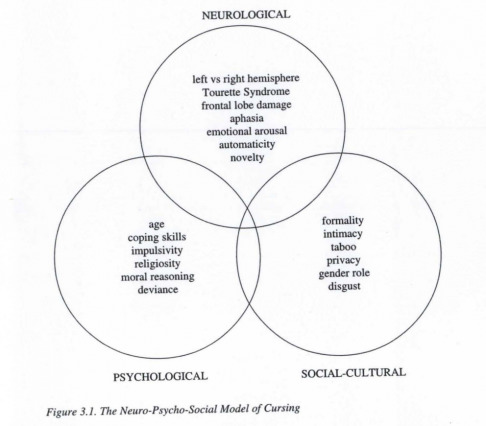
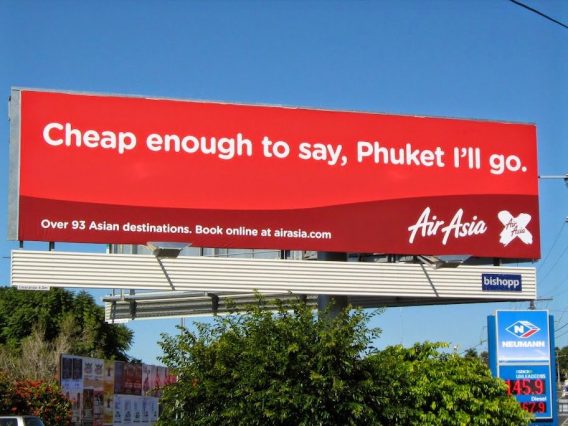




Terrific piece. I love Joanna’s take on swearing, that it’s a form of jargon and at time subtly appropriate. Other times, I like the Seinfeld opinion–that it often displays lack of creativity.
Thanks Chris! Glad you liked the article.
Who’s your audience? Who’s reading your copy? And TEST. Test. Test. You can’t optimize shit without testing, right? :-) If you really, honestly don’t swear in real life, then don’t have it in your copy. You need to target the folks who are your buyers, and those you want to work with. If they don’t swear, don’t put it in your copy. IF they do, then it’s okay to put in your copy. The degree of use and severity of words is certainly testable. Ultimately, you want to identify with your audience in a way that they’re okay doing business with you. Look at the coup Frank Kern pulled off from ’06 to about ’11 when he started cleaning up his act as a multi-millionaire. He backed off the f-bombs, but today, as an even more influential marketer, he’ll use a little bit. A little bit. Why? Ask him. I guarantee he’s got the numbers to back off the change.
Of course I forgot to mention that the article is very well done, plus it actually got a response from me and I don’t respond to anything. So — Hooah! WTG!
Thanks for the thoughtful response, Russ. Solid summary and I will definitely look into the Frank Kern example.
Glad you liked the article! Hope to hear from you more often.
Even testing is risky. Dropping in the wrong word – once – could cause some subscribers to unsubscribe right then and there. I love to integrate humour like Lianna but side with James on the idea that it’s better to err on the side of not being offensive.
Thanks for taking the time to read and comment, Kelly. You’re absolutely right. It’s risky, but you could start small by testing less taboo words. I doubt people will run away in droves.
I’d really like to explore the connection between swearing and perceived trustworthiness / authenticity more in-depth. After all, I can’t think of a person I’ve had more than a handful of conversations with who doesn’t swear at all.